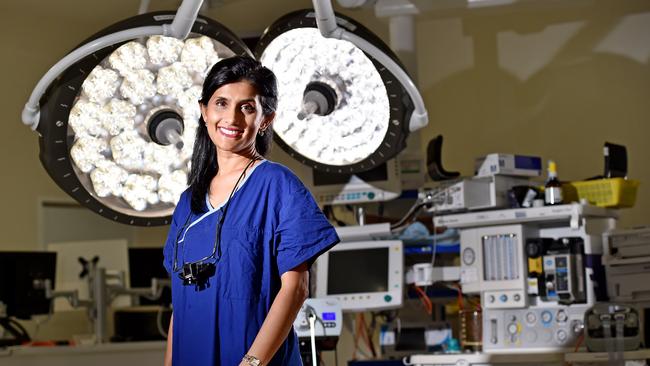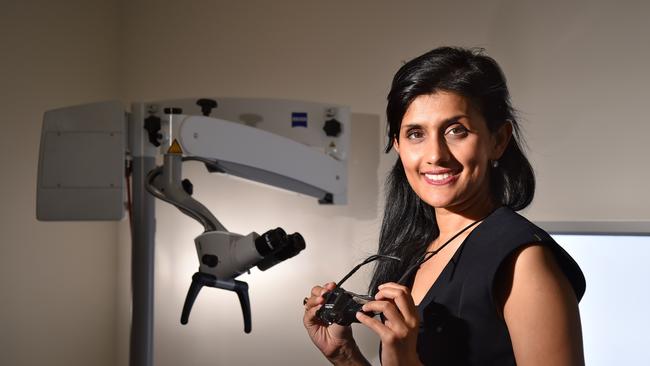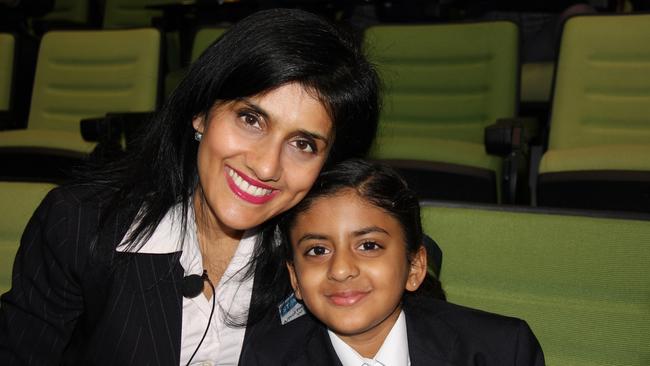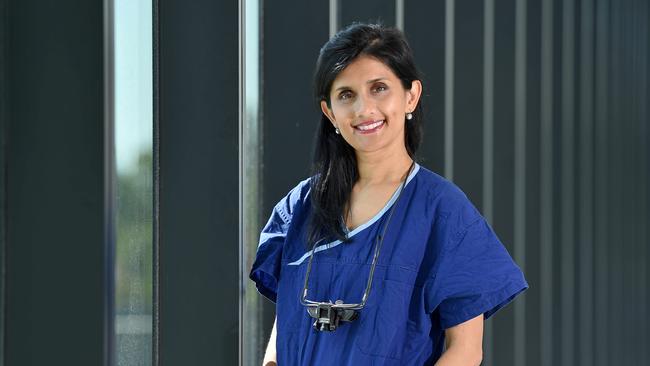Surgeon Payal Mukherjee wants to be a role model for women
Wahroonga surgeon and NSW woman of the year finalist Payal Mukherjee wants to be an agent of change for women in medicine and beyond.

North Shore
Don't miss out on the headlines from North Shore. Followed categories will be added to My News.
One of four finalists for the NSW Premier’s Woman of the Year Award, Associate Professor Payal Mukherjee, is an ear, nose and throat surgeon who spent her first 12 years in India, lives in Wahroonga and works at the SAN (Sydney Adventist Hospital) as well as the Royal Prince Alfred Hospital in Camperdown. Her work has led her to advocate for gender equality in medicine and beyond, and Mukherjee has a specific interest in educating around — as well as preventing — domestic violence among her patients and colleagues.
The 40-year-old says she recalls when she first found herself dealing with victims of domestic violence.
“As an ENT surgeon I see all sorts of people,” she says of the patients who presented with injuries caused by violence at home.
“I was initially uncomfortable and didn’t know how to deal with them. I was feeling helpless — like I was putting on a Band-Aid and sending them back.”
She realised that while she didn’t understand how to contribute to a solution, neither did her colleagues in the surgical profession.
“In the surgical world, they don’t see (domestic violence) as a surgical problem,” Mukherjee says. “They see the injury, but they don’t have time to see the cause of the injury, the cause behind the trauma.”

The turning point for the young ENT doctor was a patient with a perforated eardrum that had been repaired elsewhere, but was now infected. Despite her pain, the woman was mainly concerned about her husband, who had caused the original injury and who was pacing the floor just outside the examination room.
“I felt so uncomfortable and angry inside, on so many levels,” Mukherjee recalls. “I thought ‘What could I do next time to make this better?’.”
This began Mukherjee’s work in the field. As a member of the Royal Australasian College of Surgeons, she now helps support victims within the medical field, as well as medical staff who treat patients who are the victims of domestic violence. Domestic violence is preventable, yet it currently presents a greater health risk for Australian women than alcohol or smoking.
“I see the human side of what the family lives through,” she says of her experience. “It is your moments of adversity that make you a more empathetic doctor and a more empathetic human being, and I want to make sure that the next generation of girls has better opportunities because I don’t think it’s good enough that kids are growing up seeing domestic violence. It’s the cycle that continues. If we don’t stop the cycle now, they grow up thinking this is how men treat women. ”

Mukherjee is a middle child with two older brothers and two younger ones, and her own family was instrumental in affirming her robust self-belief and her core values.
“My grandmother instilled in me the value of gender equality, of feeling empowered to be a woman and pursue my best.”
One of her late father’s great lessons for her was that an education was more important than anything else for a successful life.
“His idea was that you may lose your house or your bank balance, but if you have an education you can rebuild that, using your brain and your emotional resilience.”
IN OTHER NEWS
When she was at school at Cheltenham Girls High and then North Sydney Girls High, she was torn between a future in engineering, like her father and one of her older brothers, and studying medicine. The medical path won the day, due to Mukherjee’s desire to interact with a range of humanity, despite — or perhaps because of — the complex issues that accompany that.
She is currently working towards a PhD in disruptive technologies, specialising in medical applications of augmented reality, virtual reality and 3D printing.
The PhD combines her interest in medicine and engineering.

Mukherjee lived in India for the first 12 years of her life and describes herself as Indian-Australian.
She also lived for a short time in the Middle East, but it’s Sydney where she completed her studies and the north shore where she has chosen to settle, work and raise her daughter, Eesha, now eight. The single parent says she chose the north shore because she wanted her daughter to have access to some of Sydney’s best schools, and because the area is so friendly.
“The north shore has a sense of community and that’s also why I love working at the SAN. There’s a real sense of community, there’s a level of education, it’s multicultural, it’s just a really lovely place to live.”
When not working, she enjoys participating in traditional Indian dance and also likes to paint.
“I think if I didn’t have that creativity in a field like ENT, I wouldn’t be able to be the academic that I am. All these skills allow me to be the person I am,” she says.
“When I was going through surgical training, I saw the pathway ahead, but I think these other experiences took me to the path less travelled.”

While she enjoys being at home, Mukherjee’s work takes her all over the globe. Following her interview and photo shoot for the North Shore Times, she boarded a flight to Italy for a surgical conference, to represent women in her field.
Her nomination for NSW Premier’s Woman of the Year was unexpected for Mukherjee, as was making it to the final four, but she sees the honour as an opportunity to advocate for her chosen causes.
“Anything like this is ultimately giving recognition to women, which I think is much needed in our society,” she says. She acknowledges that being a woman of STEMM (Science, Technology, Engineering, Mathematics and Medicine) means visibility is important to change the numbers of women who work in these fields. Once gender equality is achieved, men and women can move forward.
“For the next generation, our conversations about gender equality and greater numbers in STEMM should pay dividends,” she says. “So then the next generation is able to cultivate the best talent. We’d like to change the numbers, frankly. That’s how you change the conversation.”
